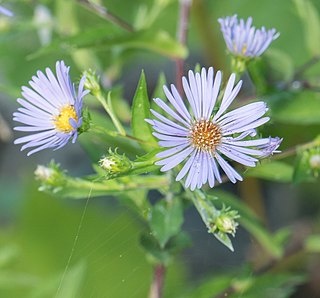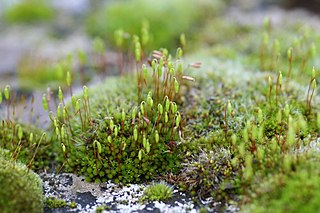The Flora of North America North of Mexico is a multivolume work describing the native plants and naturalized plants of North America, including the United States, Canada, St. Pierre and Miquelon, and Greenland. It includes bryophytes and vascular plants. All taxa are described and included in dichotomous keys, distributions of all species and infraspecific taxa are mapped, and about 20% of species are illustrated with line drawings prepared specifically for FNA. It is expected to fill 30 volumes when completed and will be the first work to treat all of the known flora north of Mexico; in 2015 it was expected that the series would conclude in 2017. Twenty-nine of the volumes have been published as of 2022.
William Alfred Weber was an American botanist and lichenologist. He was Professor Emeritus at the University of Colorado at Boulder and former curator of the University of Colorado Museum Herbarium.

Symphyotrichum puniceum, is a species of flowering plant in the family Asteraceae native to eastern North America. It is commonly known as purplestem aster, red-stalk aster, red-stemmed aster, red-stem aster, and swamp aster. It also has been called early purple aster, cocash, swanweed, and meadow scabish.
Ptychostomum warneum, known as sea bryum or Warne's threadmoss, is a protected moss found in sandy coastal areas in temperate regions of Europe and is also recorded to have been found in the Himalaya, the Altai Mountains and in Quebec, Canada.

Bryaceae is a family of mosses.
Heinrich Gustav Mühlenbeck, name also given as Henri Gustave Muehlenbeck was an Alsatian physician and botanical collector known for his work with bryophytes.

Bryum is a genus of mosses in the family Bryaceae. It was considered the largest genus of mosses, in terms of the number of species, until it was split into three separate genera in a 2005 publication. As of 2013, the classification of both Bryum and the family Bryaceae to which it belongs underwent significant changes based on DNA studies.

Hypericum gymnanthum, the small-flowered St. John's wort or clasping leaf St. John's wort, is a species of flowering plant in the St. John's wort family Hypericaceae native to wet woods, bogs, and ditches of the eastern United States and Guatemala. It has been introduced to Poland.

Ptychostomum turbinatum, also known as topshape thread-moss or pear-fruited bryum, is a species of moss found in continental Europe and the US. The species became extinct across the British Isles in the 1940s according to the Species Recovery Trust and in 2001 according to the IUCN, and it has not reestablished since.

Syntrichia is a large, cosmopolitan genus of mosses in the family Pottiaceae. The genus name is of Greek origin for "with" and "hair", referring to the "twisted peristome united by a basal membrane".
Bryum blindii, commonly known as Blind's bryum moss, is a species of moss belonging to the family Bryaceae.

Ptychostomum pseudotriquetrum, commonly known as marsh bryum, is a species of moss belonging to the family Bryaceae. Bryum pseudotriquetrum is a synonym. The species has cosmopolitan distribution.
Ptychostomum knowltonii is a species of moss belonging to the family Bryaceae. Its green leaves are ovate and strongly concave.

Ptychostomum schleicheri, the Schleicher's bryum moss, is a species of moss belonging to the family Bryaceae. The leaves' color ranges from yellow to yellow-copper.

Ptychostomum is a genus of mosses belonging to the family Bryaceae. It has an almost cosmopolitan distribution. It has two subgenera, Psychostomum (Ptychostomum) and Psychostomum (Cladodium).
Gemmabryum is a genus of moss in the family Bryaceae. It was separated from the genera Bryum and Brachymenium in 2005. It has been argued that the correct name for the genus is Osculatia.








